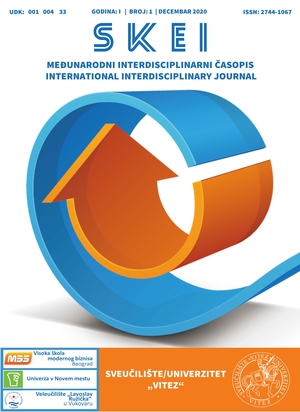CURRENT DEGREE OF DIGITALIZATION OF COMPANIES IN BOSNIA AND HERZEGOVINA: COMPARISON BETWEEN SMALL, MEDIUM AND LARGE COMPANIES
CURRENT DEGREE OF DIGITALIZATION OF COMPANIES IN BOSNIA AND HERZEGOVINA: COMPARISON BETWEEN SMALL, MEDIUM AND LARGE COMPANIES
Author(s): Silvio Vuković, Darijo JerkovićSubject(s): National Economy, Business Economy / Management, Micro-Economics, Accounting - Business Administration, ICT Information and Communications Technologies, Socio-Economic Research
Published by: Sveučilište/Univerzitet "VITEZ"
Keywords: digitalization of business; indicators of digitalization; degree of digitalization;
Summary/Abstract: The digitalization of business has become a trend that has engaged the entire business world. The advancement of digital, communication, and information technologies has influenced all aspects of modern life and work. In this environment, digitalization of business is no longer a luxury but a necessity, if one wants to survive in today's market. The European Union recognized digitalization as necessary process for maintaining and improving competitiveness, and sets establishment of a single market, innovation, and digitalization as the first strategic goals in its strategic framework and development programs for the period 2021- 2027. Today, companies face the challenge of effectively transforming and digitalizing their businesses. In Bosnia and Herzegovina, it is important to ask how much companies from this market are aware of the need for digitalization, and how far they have come in the process of digitalizing their business. Does this need affect only large companies, or similar processes also have to take place in the SME sector? The authors aim to determine whether there are significant differences in perceptions and the degree of digitalization between small, medium, and large companies in the market of Bosnia and Herzegovina. The authors analyzed the answers of 82 managers or owners of BiH companies, examining three key indicators of the current level of digitalization of business: (1) attitudes about digitalization processes in their own business, (2) the level of application of modern software solutions and applications (ERP, CRM, DMS, WMS, eCommerce) and their impact on business, and (3) technical aspects of digitalization, i.e. improvement of the digital environment in which companies operate. These aspects of digitalization are not directly controlled by companies but can significantly impact their business, including electronic seal and signa.ture, EDI application possibilities, application of barcodes, and artificial intelligence (AI)
Journal: Skei - međunarodni interdisciplinarni časopis
- Issue Year: 5/2024
- Issue No: 2
- Page Range: 6-24
- Page Count: 19
- Language: English

